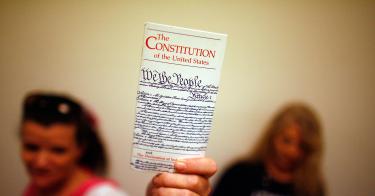Recent polls show just how confused Americans are about our system of government in general and the judiciary in particular. The founders would have found this deeply troubling, as they argued that the people must be “well-informed” and “well-instructed” to be trusted with self-government and to remain free.
A recent poll from the Annenberg Public Policy Center, for example, showed that just 49% say that Supreme Court justices set aside personal and political views to rule based on the law and the facts of each case. At the same time, 48% say that the Supreme Court should be made less independent so that it “listens a lot more to what the people want.”
In a Quinnipiac University poll earlier this year, 59% said that Supreme Court justices are “too influenced by politics.” And in the Annenberg poll, 89% say that judges should base their decisions on “the facts of the case, the law, and the Constitution.” But a recent poll by Marquette University Law School found a majority want judges to treat the Constitution as “a document whose meaning may have evolved over time.”
In the Marquette poll, 37% said senators would be justified in voting against a Supreme Court nominee because of “how they believe the Justice would decide cases.” But a Gallup poll just one year earlier had a different finding: 49% said senators would be justified opposing a nominee because of “the nominee’s stance on current issues such as abortion, gun control or affirmative action.”
All of this puts polls that ask whether people have “trust or confidence” in the Supreme Court or approve of how the Supreme Court is “handling its job” into context. It’s clear that most Americans don’t know what that job is.
But should we be surprised? The Marquette poll showed that 57% of Americans haven’t read the Constitution, even though it’s one of the shortest in the world. In fact, I took two courses in constitutional law in law school and was never required to read it.
Yet, I did read it and so should everyone else. Simply reading the Constitution will reveal a few things. First, to state the obvious, it’s written down. That simplifies the task of trying to figure out what the authors meant.
Second, people will find that some things they thought were in the Constitution aren’t there after all. I don’t mean just the weird things such as thinking the First Amendment protects the right to own a pet (12% think this), as well as seriously misguided things such as the First Amendment supposedly creating a “wall of separation between church and state.” It never actually says that.
People might just see the Constitution is not so mysterious after all. Yes, it was written a long time ago and has some words that have dropped out of popular usage. And yes, there are general-sounding phrases that, at least standing alone, aren’t very clear. But there are also words, phrases, and provisions that have a commonsense meaning. You won’t know until you read it.
The Pew Research Center has found that, as they get older, people shift from saying that the Constitution should be interpreted for what it “means in current times” to what it “meant as originally written.” With a little experience, a little maturity, and a little observation about how easily the tides of political and social life can shift, people seek firmer ground. That’s what makes for successful self-government.
But that can’t happen unless we read it first.
This piece originally appeared in the Washington Examiner



